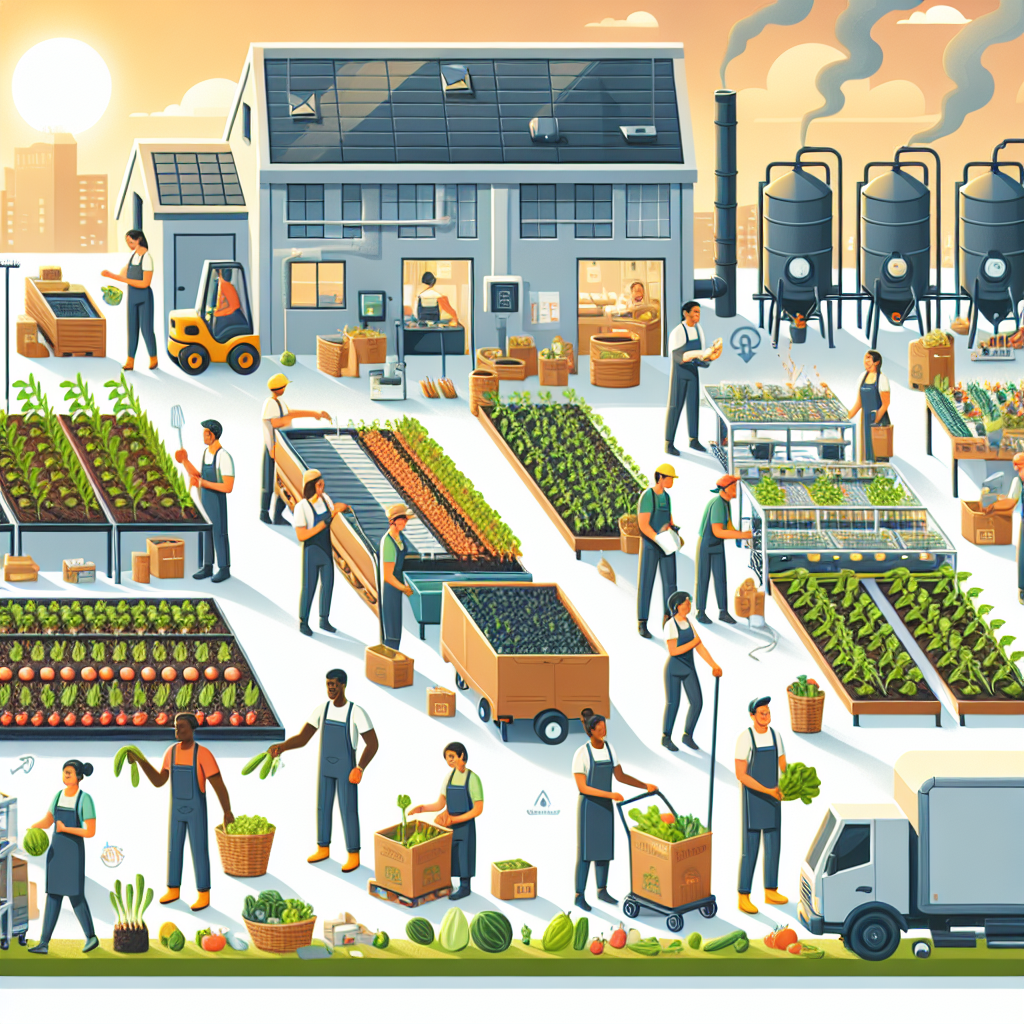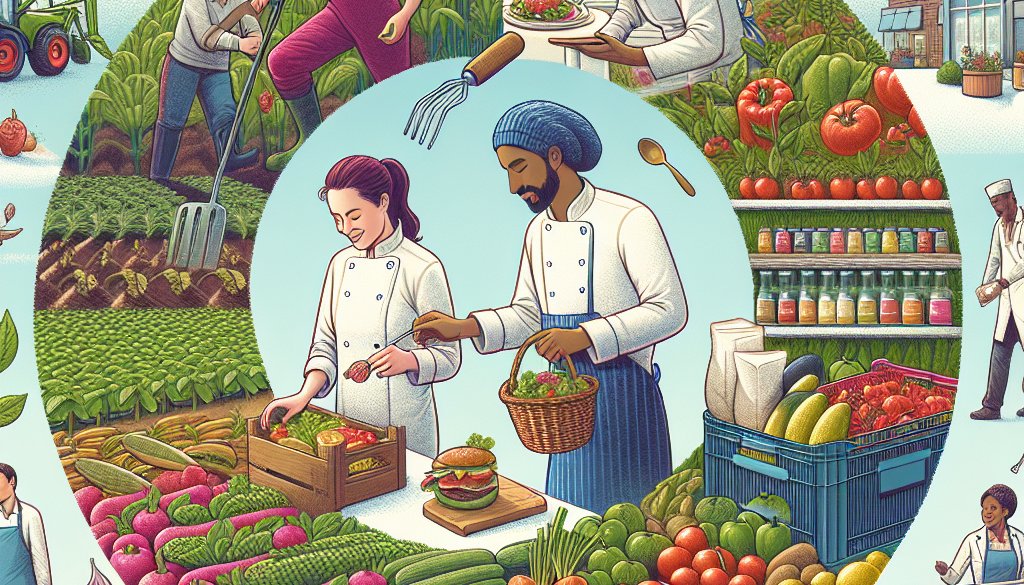Exploring the Opportunities for Sustainability in the Food Industry
-
Table of Contents
- Sustainability in the Food Industry: Opportunities and Innovations
- The Urgency for Sustainable Practices
- Opportunities for Sustainable Agriculture
- Reducing Food Waste
- Plant-Based and Alternative Proteins
- Energy Efficiency and Renewable Energy
- Water Stewardship
- Responsible Packaging
- Consumer Education and Engagement
- Conclusion: Embracing Sustainability as the Future of Food
- ETprotein: Leading the Way in Sustainable Protein Solutions
Sustainability in the Food Industry: Opportunities and Innovations

The food industry is at a critical juncture where the demand for sustainable practices is no longer a choice but a necessity. With the global population projected to reach 9.7 billion by 2050, the pressure on food systems to produce more with less is immense. This article explores the myriad opportunities for sustainability within the food industry, highlighting innovative approaches and the potential benefits of adopting such practices.
The Urgency for Sustainable Practices
Current food production and consumption patterns are contributing to environmental degradation, climate change, and resource depletion. The food sector is responsible for approximately 26% of global greenhouse gas emissions, making it a significant contributor to climate change. Moreover, agriculture occupies about 50% of the world’s habitable land, leading to biodiversity loss and ecosystem disruption. The need for sustainable solutions is clear and urgent.
Opportunities for Sustainable Agriculture
- Regenerative Agriculture: This approach goes beyond minimizing impact to actively improving the ecosystem. It includes practices like crop rotation, cover cropping, and reduced tillage, which enhance soil health, sequester carbon, and increase biodiversity.
- Precision Farming: Leveraging technology such as GPS, drones, and IoT devices can optimize resource use and reduce waste by providing precise data for better decision-making.
- Organic Farming: By avoiding synthetic pesticides and fertilizers, organic farming can reduce environmental toxins and improve soil fertility.
Reducing Food Waste
Approximately one-third of all food produced globally is wasted. Addressing this issue presents a significant opportunity for sustainability. Strategies include:
- Improving supply chain efficiency to reduce spoilage during transportation and storage.
- Implementing better inventory management and forecasting in retail to prevent overstocking.
- Encouraging consumers to buy imperfect produce and educating them on proper food storage.
Plant-Based and Alternative Proteins
The production of plant-based and alternative proteins is less resource-intensive than traditional animal agriculture. Companies like Beyond Meat and Impossible Foods have popularized plant-based meat alternatives, while others are exploring lab-grown meats and insect proteins as sustainable options.
Energy Efficiency and Renewable Energy
Transitioning to renewable energy sources and improving energy efficiency in food production can significantly reduce the industry’s carbon footprint. Solar, wind, and biogas can power operations, while energy-efficient equipment can lower overall consumption.
Water Stewardship
Water scarcity is a growing concern, and the food industry is a major water user. Opportunities for sustainable water use include:
- Implementing drip irrigation and other water-saving technologies in agriculture.
- Recycling water in processing facilities.
- Developing products that require less water to produce, such as drought-resistant crops.
Responsible Packaging
Excessive packaging contributes to pollution and waste. The industry can adopt sustainable packaging solutions like biodegradable materials, recyclable or reusable containers, and minimal packaging designs.
Consumer Education and Engagement
Consumers play a crucial role in driving demand for sustainable products. Educating them about the benefits of sustainable choices and providing transparent information can lead to more environmentally friendly purchasing decisions.
Conclusion: Embracing Sustainability as the Future of Food
The opportunities for sustainability in the food industry are vast and varied. From regenerative agriculture to innovative protein sources and responsible packaging, each step towards sustainability can have a profound impact on the environment, economy, and society. By embracing these opportunities, the food industry can secure a resilient and sustainable future for generations to come.
ETprotein: Leading the Way in Sustainable Protein Solutions
ETprotein is at the forefront of providing sustainable protein products that cater to the growing demand for environmentally friendly food options. Their range of organic bulk vegan proteins and L-(+)-Ergothioneine (EGT) showcases their commitment to sustainability without compromising on quality.
With a focus on non-GMO, allergen-free products with high purity levels, ETprotein serves a diverse range of industries, from nutraceuticals to food and beverage. Their specialization in exporting and delivering tailor-made protein powder and nutritional supplements positions them as a key player in the sustainable food industry.
For businesses looking to incorporate sustainable protein options into their offerings, ETprotein provides comprehensive solutions that align with global sustainability goals. Their expertise and high-quality products make them a trusted partner for leading food and beverage brands worldwide.
About ETprotein:
ETprotein, a reputable protein and L-(+)-Ergothioneine (EGT) Chinese factory manufacturer and supplier, is renowned for producing, stocking, exporting, and delivering the highest quality organic bulk vegan proteins and L-(+)-Ergothioneine. They include Organic rice protein, clear rice protein, pea protein, clear pea protein, watermelon seed protein, pumpkin seed protein, sunflower seed protein, mung bean protein, peanut protein, and L-(+)-Ergothioneine EGT Pharmaceutical grade, L-(+)-Ergothioneine EGT food grade, L-(+)-Ergothioneine EGT cosmetic grade, L-(+)-Ergothioneine EGT reference grade and L-(+)-Ergothioneine EGT standard. Their offerings, characterized by a neutral taste, non-GMO, allergen-free attributes, with L-(+)-Ergothioneine purity over 98%, 99%, cater to a diverse range of industries. They serve nutraceutical, pharmaceutical, cosmeceutical, veterinary, as well as food and beverage finished product distributors, traders, and manufacturers across Europe, USA, Canada, Australia, Thailand, Japan, Korea, Brazil, and Chile, among others.
ETprotein specialization includes exporting and delivering tailor-made protein powder and finished nutritional supplements. Their extensive product range covers sectors like Food and Beverage, Sports Nutrition, Weight Management, Dietary Supplements, Health and Wellness Products, and Infant Formula, ensuring comprehensive solutions to meet all your protein needs.
As a trusted company by leading global food and beverage brands and Fortune 500 companies, ETprotein reinforces China’s reputation in the global arena. For more information or to sample their products, please contact them and email sales(at)ETprotein.com today.












